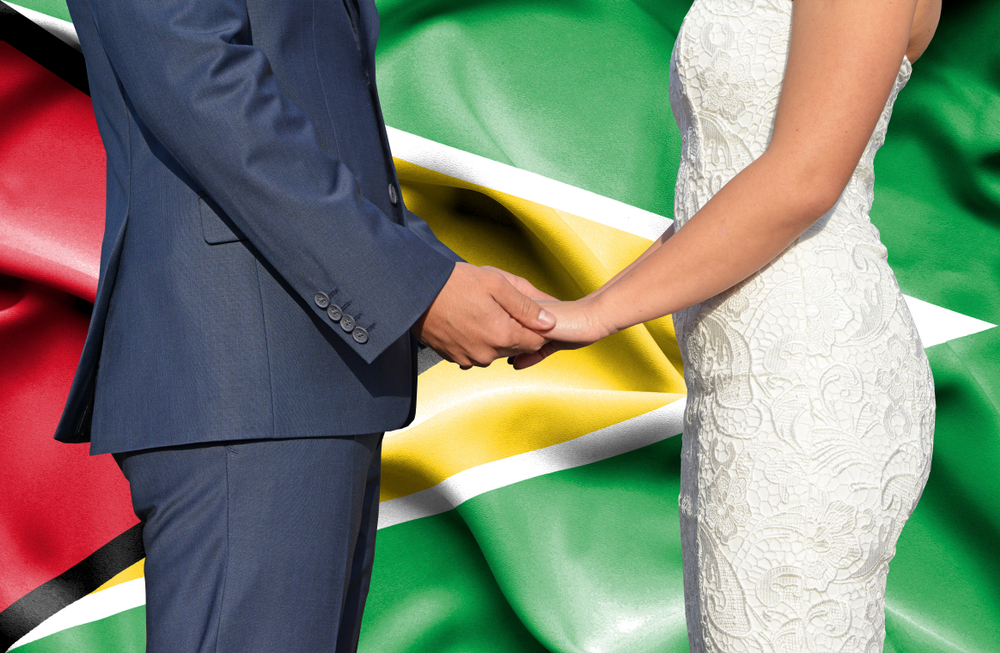By Brian Figeroux, Esq. | Editorial Credit: Lex0077 / shutterstock.com
Common law marriages in Guyana are an important aspect of the country’s legal and social landscape, providing an alternative to formal marriage for couples who choose to live together without undergoing a wedding ceremony. While common law marriages offer certain legal protections, particularly in areas such as property division and inheritance, they also come with challenges, particularly when it comes to proving the existence of the relationship and securing legal rights.
Common law marriages, often referred to as informal or de facto marriages, are recognized in many countries as a legal union between two individuals who have lived together for an extended period without undergoing a formal wedding ceremony. In Guyana, a nation with a complex blend of cultures and legal traditions stemming from both British and Dutch colonialism, common law marriages have a particular legal standing and unique implications, especially when compared to civil or religiously sanctioned marriages.
This analysis will delve into the concept of common law marriages in Guyana, examining the criteria for recognition, rights and obligations of partners, property and inheritance laws, and the need for divorce in common law marriages. Additionally, it will explore how these marriages differ from legally formalized unions and the legal recourse available when the relationship dissolves.
Definition and Legal Recognition of Common Law Marriages in Guyana
In Guyana, common law marriages are generally recognized as long-term cohabitation relationships between two individuals who live together as though they were married, but without formal legal or religious ceremonies. According to Guyanese law, a common law union exists when a couple has lived together in a conjugal relationship for at least five years. This extended period of cohabitation distinguishes common law marriages from casual or temporary relationships, requiring proof of a long-term, committed partnership.
The legal recognition of common law marriages in Guyana provides certain protections and rights to the partners, although these rights are more limited than those conferred upon legally married couples. The legal status of common law unions in Guyana largely stems from the country’s colonial history, which has left a legacy of both civil law (rooted in British common law) and religious traditions. While the formal institution of marriage has always been supported and regulated by law, common law marriages have historically been given recognition in some contexts, particularly in property and inheritance matters.
Rights and Obligations in Common Law Marriages
Partners in a common law marriage in Guyana enjoy several rights similar to those in formal marriages, particularly regarding property division and inheritance after one partner’s death. However, these rights are not identical to those granted in formal marriages and may be subject to limitations or additional requirements for legal recognition.
Property Rights
One of the primary concerns in any marriage—formal or common law—is property rights. In Guyana, the law allows common law partners to claim property acquired during the relationship if the couple can prove their status as common law spouses. Courts often look for evidence that the couple lived together for five years or more and that they presented themselves as a couple to the public. Joint ownership of property, financial interdependence, and shared responsibilities (such as raising children or managing a household) may serve as further evidence of a common law marriage.
While common law partners can claim an interest in property acquired during the relationship, property rights are not automatic and may be subject to legal challenges. In formal marriages, spouses generally enjoy equal ownership of marital assets regardless of individual contributions. In contrast, common law partners may need to demonstrate their financial or non-financial contributions to the acquisition or maintenance of the property to claim an equitable share.
Inheritance Rights
Inheritance rights in common law marriages in Guyana can be more complex than in formal marriages. If one partner in a common law union dies without a will (intestate), the surviving partner may face challenges in inheriting the deceased’s property. Under Guyanese law, formal marriage automatically grants spouses inheritance rights, but common law partners may not receive the same entitlements. To claim inheritance, the surviving partner may need to prove the existence of a common law marriage, which could involve providing evidence of cohabitation, shared finances, or testimonies from family and friends.
The legal standing of common law partners in inheritance matters is particularly relevant in cases where the deceased’s family members contest the claim. In some instances, the surviving partner may be required to initiate legal proceedings to assert their rights, a process that can be emotionally and financially draining.
Children and Parental Rights in Common Law Marriages
Another critical aspect of common law marriages in Guyana involves parental rights and the legal standing of children born to common law partners. Under Guyanese law, children born to common law couples have the same legal rights as children born to formally married couples. This means that common law parents share parental responsibilities, including custody, support, and decision-making for the child’s welfare.
If a common law relationship dissolves, both parents are expected to continue supporting their children financially and emotionally, regardless of their marital status. In cases of dispute, the courts will intervene to determine custody arrangements based on the child’s best interests, as is the case with formally married couples.
Need for Divorce in Common Law Marriages
One of the most significant distinctions between formal marriages and common law unions in Guyana is the process required to dissolve the relationship. Formal marriages in Guyana require legal divorce proceedings to officially end the marriage. Divorce is a legal process that involves the dissolution of the marriage contract, division of assets, and decisions about custody and support of any children.
In contrast, common law marriages do not require formal divorce proceedings to end the relationship. Since the couple was never legally married, there is no need to go through the court system to dissolve the union. However, if the couple has acquired joint property, shared debts, or children during the relationship, they may need to seek legal assistance to resolve these matters, much like in a formal divorce. The courts can intervene in cases where the partners cannot reach an agreement on property division or child custody.
When Divorce is Needed in Common Law Marriages
While common law marriages do not require formal divorce, there are situations where legal intervention is necessary to resolve disputes, especially concerning property and custody rights. The dissolution of a common law relationship may lead to significant disagreements over assets or financial responsibilities, necessitating legal recourse.
Property and Asset Division
In cases where a common law couple cannot agree on how to divide property and assets, the courts may become involved to determine an equitable distribution. As mentioned earlier, common law partners do not have automatic property rights, and legal disputes may arise when one partner attempts to claim an interest in jointly acquired property. In such situations, the court will examine the contributions of each partner to the relationship, both financial and non-financial, to arrive at a fair division of assets.
Child Custody and Support
If children are involved, the dissolution of a common law relationship can lead to custody and support disputes. In such cases, the courts will intervene to ensure that the child’s best interests are protected, and that both parents continue to fulfill their responsibilities. Just as in formal divorce cases, the court may determine custody arrangements and order child support payments if necessary.
Legal Protections and Challenges for Common Law Couples
While common law marriages in Guyana provide certain legal protections, they also come with challenges that formal marriages do not face. One of the primary difficulties for common law partners is proving the existence of the relationship, especially when legal recognition is required for property division, inheritance, or custody matters.
The absence of a marriage certificate means that common law couples must rely on other forms of evidence to establish their relationship. This could include witness testimonies, joint financial records, or proof of shared residence. However, these forms of evidence may not always be readily available or sufficient to satisfy legal requirements, leaving common law partners vulnerable in disputes over assets or inheritance.
Policy and Legislative Considerations
The legal landscape for common law marriages in Guyana has evolved over time, reflecting changing societal attitudes toward informal unions and the need for legal protections. As common law marriages become more prevalent, policymakers may need to consider further legislative reforms to enhance the rights and protections of common law partners, particularly in areas such as property division, inheritance, and child custody.
One potential area for reform could involve the creation of a legal registry for common law marriages, similar to civil partnerships in other jurisdictions. Such a registry would allow common law couples to formally document their relationship and receive the same legal protections as formally married couples, without undergoing a religious or civil wedding ceremony. Additionally, clearer guidelines on property division and inheritance rights for common law couples could help reduce legal disputes and provide greater security for partners in these relationships.
Conclusion
Common law marriages in Guyana are an important aspect of the country’s legal and social landscape, providing an alternative to formal marriage for couples who choose to live together without undergoing a wedding ceremony. While common law marriages offer certain legal protections, particularly in areas such as property division and inheritance, they also come with challenges, particularly when it comes to proving the existence of the relationship and securing legal rights.
The dissolution of common law relationships does not require formal divorce proceedings, but legal intervention may be necessary in cases of property disputes or child custody matters. As the prevalence of common law marriages continues to grow in Guyana, policymakers may need to consider further legislative reforms to enhance the rights and protections of common law partners, ensuring that these unions are afforded the same legal recognition and security as formal marriages.
Ultimately, while common law marriages offer flexibility and freedom for couples, they also require careful consideration of legal and financial matters, particularly when the relationship ends. By understanding the legal implications of common law marriages and seeking legal advice when necessary, couples can protect their rights and ensure that their interests are safeguarded in the event of a breakup.
Click Here to Schedule a Consultation with Figeroux & Associates Today!




